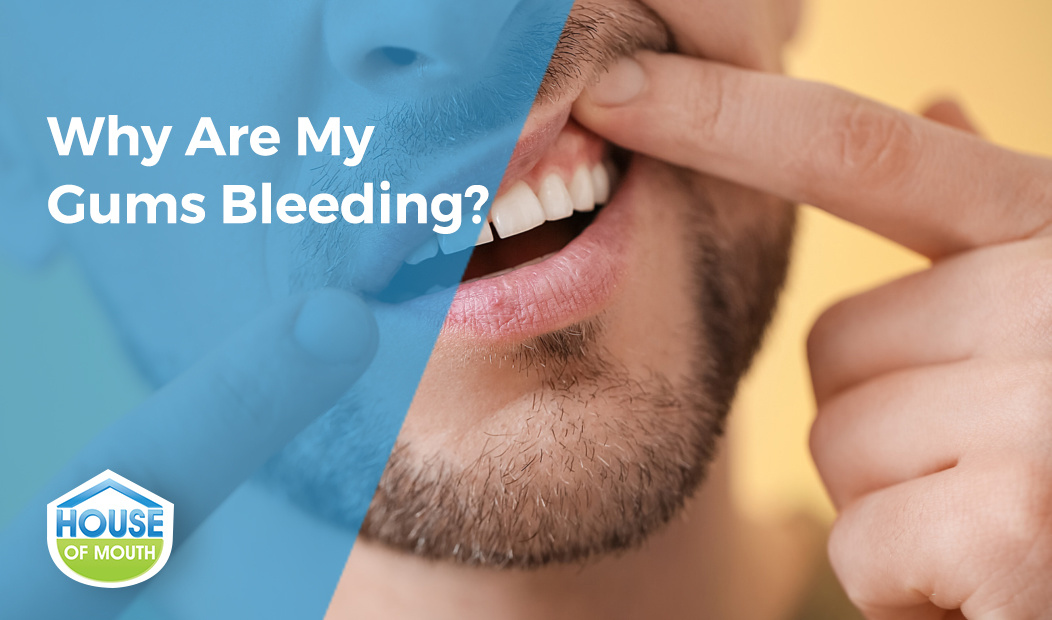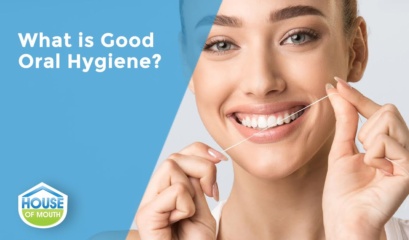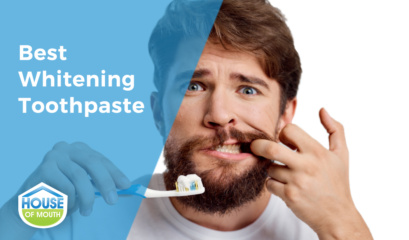Many people believe that it is normal to see a little blood when brushing your teeth, but that is not true. Bleeding gums is a sign that something is wrong, and maintaining good oral health is very important to your overall well being.
Factors like brushing too vigorously, injury, pregnancy, and inflammation can contribute to bleeding gums. Gum inflammation can cause redness, swelling, and tenderness, and it can be a sign of periodontal diseases, such as gingivitis or periodontitis. Such conditions can occur from inadequate plaque removal.
Identifying the cause of bleeding gums is key to determining the most appropriate treatment. Once you know the reason, knowing the solution to the problem will be easy.
Bleeding Gum Causes
Gingivitis
The leading cause of bleeding gums is plaque buildup at the gumline. If not removed, this condition eventually evolves into gingivitis or inflamed gums, where gums become swollen, tender, and bleed while brushing your teeth. If not treated, gingivitis can lead to gum disease, one of the leading causes of tooth loss in adults.
Pregnancy
If you are pregnant and experiencing gum bleeding, don’t be afraid. About half of all pregnant women experience swollen, red, tender gums that bleed during brushing. Bleeding gums happen because the hormonal changes during pregnancy alter the body’s response to bacteria that causes gum disease. It is very common for pregnant women to get gingivitis.
Brushing Your Teeth Too Hard
Brushing too hard can cause the gum tissue to shrink back. Not only will this affect the way your smile looks, but if the recession progresses far enough, the roots of your teeth may become exposed. Tooth roots are more sensitive to outside stimuli and may be more prone to decay than the top portion of teeth because they have no enamel to protect them.
Poor diet
If you eat a nutritionally poor diet full of sugar-based foods, you increase the risk of bleeding gums and tooth decay. Sugar creates the perfect conditions for plaque to grow and produces more acids that eat away at tooth enamel. Bleeding gums can also signify vitamin C, calcium deficiency, and some ingredients in some processed food can irritate the gum and cause them to bleed.
Wearing dentures that fit incorrectly
Dentures that do not fit properly can cause gum bleeding if they scratch your gums and cause sores. People who do not take out their dentures at night may be especially prone to bleeding gums. If you wear dentures, it is essential to brush your teeth and clean your dentures well to prevent plaque buildup and gum inflammation.
Bleeding Gums Treatment
Mild cases
If it is occasional and very slight bleeding, you can treat it with a special mouthwash for the gums or an antibacterial gel. In addition, proper tooth brushing and flossing with a dentist recommended manual or power toothbrush, plus using dental floss or interdental brushes, is the best way for inflamed tissues and gums to return to normal. After a meal, brushing your teeth can resolve the gum bleeding symptoms. Try an extra soft bristle toothbrush in order to be as gentle as possible on your gums.
Serious cases
If there is heavy bleeding from your gums, treatment by a dental professional is necessary. They will perform a diagnosis of the gums and will analyse the depth that the tartar has reached with a periodontal probe. If no significant complications appear, professional cleaning in principle will thoroughly remove the accumulated bacterial plaque, improve the inflamed tissue, and resolve your bleeding gums.
How to Prevent Gum Bleeding?
Eat a balanced diet
Strengthening teeth and gums through healthy eating is more straightforward than it may seem. Reduce your consumption of sugar as it facilitates the accumulation of tartar and eat more fruits and vegetables. Include fruits rich in vitamin C such as orange, lemon, or grapefruit in your diet, or those that provide vitamin K such as kiwi, pear, or plums. Applying a balanced diet will help the blood clotting process and promote the health of your gums.
Use a soft toothbrush
Occasional bleeding from the gums can result from poor brushing technique, so don’t brush your teeth too vigorously and use a soft toothbrush. You may also consider using an electric toothbrush to prevent gum bleeding, as the specially designed heads on these brushes can help clean the gum line more quickly than a manual toothbrush.
Practice good oral hygiene
Bleeding gums may be a sign of poor dental hygiene. Brushing your teeth twice daily – in the morning and before going to bed will help prevent bleeding gums. It is better if you can brush after every meal. Flossing before you brush allows you to clean away the loosened food particles and bacteria from the floss. You can even try interdental brushes if your teeth have larger gaps where floss is inadequate!
Regular dental visits
Visiting a dentist regularly (at least every six months) for cleaning will help prevent bleeding gums. They will help identify diseases that our physical eyes cannot see, and this will help the dentist monitor changes in your dental health.
Reduce Your Stress Levels
Stress causes inflammation throughout your body, particularly in the blood vessels. These break down soft tissues in your mouth, further slowing the healing process for bleeding gums. Trying to reduce your stress levels whenever possible will help prevent any potential bleeding gum issue.
Stop Smoking
Smoking increases your risk for oral health problems, including sensitive, diseased, and bleeding gums. Once gum bleeding starts, dangerous bacteria trapped between the teeth and the gum line can get into the bloodstream, causing further complications. Quitting smoking will help prevent bleeding gums.
Our Products to Help with Bleeding Gums
The bleeding gums can occur at any age but are most common in adults who don’t have consistent dental hygiene.
If you notice symptoms such as red, swollen, or tender gums, or you see bleeding gums after brushing or your gums bleed when flossing, it is highly recommended that you adjust your use of dental products first by choosing:
- Extra soft bristle toothbrushes – brush at least twice daily, morning and night
- Dental floss, tape or ribbon – use at least once daily before brushing
- Interdental brushes, toothpicks or flosses – use at least once daily and after meals or snacks
- A chlorhexidine mouthwash and toothpaste – use twice daily until symptoms subside
- Gum serum or gel – apply at least once daily with your finger, toothbrush or interdental brush
If your gums bleed persistently or if you experience ongoing pain associated with bleeding gums, don’t wait for your next checkup. When left untreated, bleeding gums can lead to more serious oral health problems, so making an appointment with your dentist will be the best option.

















